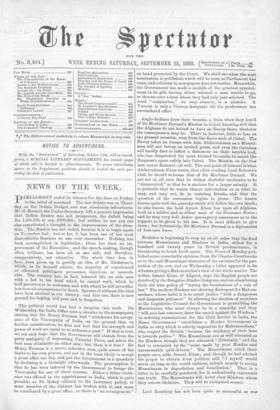The political world has had a aurprise this week. On
Wednesday, the India Office sent a circular to the newspapers, stating that Sir Henry Norman had "withdrawn his accept- ance of the Viceroyalty of India, on the ground that, on further consideration, he does not feel that his strength and power of work are equal to so arduous a post." If that is true, we can only hope that the Government will abstain from the petty malignity of boycotting Unionist Peers, and select the best man obtainable on either side ; but, then, is it true ? Sir Henry Norman is a grave, reflective man, quite aware of the limits to his own powers, and not in the least likely to accept a great office one day, and put the Government in a quandary by declining it a fortnight afterwards. The presumption is that he has been induced by the Government to forego the Viceroyalty for one of three reasons. Either a bitter resist- ance was offered to the appointment in India, which is quite possible, as Sir Henry adberes to the Lawrence policy, or some member of the Cabinet has broken with it, and must be conciliated by a great office ; or there is "an arrangement" on hand promoted by the Court. We shall see when the next nomination is published, which will be soon, as Parliament has risen, and criticism in newspapers does not matter. Meanwhile, the Government has made a muddle of the greatest appoint- ment in its gift, having either selected a man unable to go, or thrown over a man whom they had only just selected. The word "resignation," we may observe, is a mistake. A Viceroy is only a Viceroy designate till his predecessor has surrendered office.


































